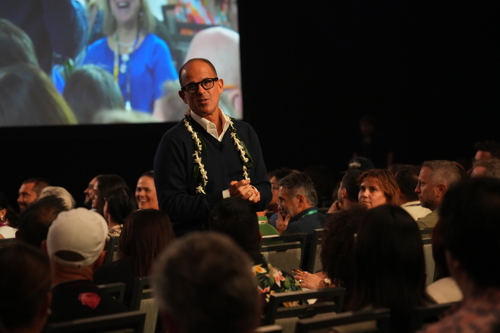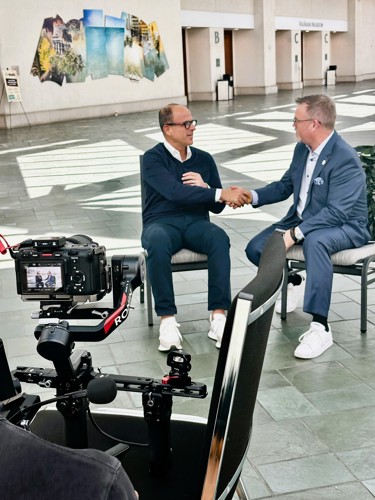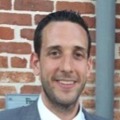A Fresh Perspective on Mentorship from Famed CEO and Business Turnaround Guru Marcus Lemonis
April 24, 2025
Published in:
The star of the forthcoming Fox series "The Fixer" offers insights for entrepreneurs at any stage of their journey. His message? Stay humble, seek advice, and never assume you have all the answers.

Marcus Lemonis delivered a rousing keynote speech during the final day of Entrepreneurs’ Organization’s 2025 Global Leadership Conference (GLC) in early April. Rather than diving into the nitty gritty of, say, how to cut costs, manage staff, or expand a business’s footprint, Marcus instead focused on the power of vulnerability and sincerity.
In front of an audience of more than 1,600 rapt entrepreneurs in Honolulu, he reflected upon his own personal failings and traumas. He explained how, even at the height of his success—hosting a hit TV show on CNBC and serving as chief executive of Camping World—he often felt empty and incomplete. That feeling led to introspection and hard-earned lessons, which Marcus shared with EO members and will impart to small business owners on his new Fox show “The Profit” that debuts later this year.
Before his address, Marcus sat down with EO to offer advice to entrepreneurs who are seeking to launch or grow their businesses in increasingly complex times, beset by ever-evolving technologies and global financial instability. This is an edited and condensed version of that conversation:
EO: Among the many small business owners you have worked with, what traits—whether it be their personality, temperament, work ethic—often lead to success?
Marcus Lemonis: The difference between success and failure is your ability to have a high level of self-awareness about your role in the business, your obligation to the business, and your contribution to the business. On the opposite side, I am finding that egos continue to be the number one detractor for success. “I know everything. I have all the answers.” That leads to inflexibility. It leads to a know-it-all mindset. I think the key—whether you are in a small, medium, or large business—is the acknowledgement that you do not have all the answers.
How important is finding a mentor, or mentors, when starting off as an entrepreneur?
I think that the word mentor tends to be misused. People think it has to be somebody who has experienced more financial success, or is older than you are, or has acquired or accomplished more. I think that is a dangerous path to go down. Oftentimes, a mentor is somebody who could teach you something or strategize with you on something that you are not familiar with. It could be a frontline worker of yours. It could be a fellow business owner. You can have multiple mentors on different topics, because my mentor on the public accounting side or on the regulatory side is very different than a mentor who helps me through difficult people issues. It is not one-size-fits-all. A mentor for me is anybody who you are willing to learn from, who you believe has your best interests in mind, and whose feedback you are willing to accept.
In all the work you have done helping other businesses, are there any success stories that stand out above the rest? What lessons can other entrepreneurs learn from those stories?
Of all the entrepreneurs that I have ever worked with, the ones that have the greatest return on investment, or the ones that are on the greatest path to success, are typically the ones that focus on the perfect balance between their professional and their personal development. I want to see people grow. I want to see them evolve as humans. I want to see them evolve as parents. I want to see them evolve as friends, as bosses. I want to see them evolve in their beliefs. I want to see them evolve in their conviction about things. When people believe that they have no personal or professional growth left, their success tends to be stunted.
What is your perspective on the importance of building a personal brand in the digital age? No matter your industry, is it vital for entrepreneurs and business owners to build a brand? You have certainly done just that—is it nearly a requirement today?
Actually, no, I tend to be slightly critical when people hyperfocus on personal brand development. I would rather them work on whatever is the best thing for the business that they own and what role can they play in being an ambassador for that business. I will use myself as an example: I have to be very conscious because I am in lots of different businesses. I have my Camping World business. I have Bed Bath and Beyond. I have buybuy Baby. I have all these different brands that go across a variety of sectors. I have to be mindful that my behavior and my actions have a direct correlation to the businesses that I am associated with. I serve the professional brand that I work for first and then my personal brand should only play a complementary role. I think, a lot of times, people get mixed up about that.
Meaning they build a personal brand that is incongruous with the business?
You are creating a conflicting message. Do not own a business that does not line up with your personal philosophy, no matter how much money you make. Because, at some point, somebody is going to bust you. It will catch up to you. Today, where people are recording seemingly everything you say or could catch you saying or doing something wrong, it can destroy your business quicker than any supply chain problem, any tariff, any bank, any customer issue. You could ruin your business in a millisecond.

Tell us about “The Fixer.” Why develop another TV show focused on helping small business owners after doing the same for many years with “The Profit?” What is different this time?
I went through 10 years of making "The Profit." I was 37 when I started, and I had not experienced everything that life had to offer. I was making decisions, either to invest in a business or to help somebody, based on love for people and my trust in people. Over time, I got burned. I got burned a lot. I got sued. I learned that I needed to approach life differently. I felt like my superpower was to be vulnerable, to share my experience, and to share my rolodex, but I needed to get people to see that the success of their business was really a function of their work, not mine. Early on, I believed that I could fix everything. I could fix you. I could fix your process. I could fix your product. I could fix everything. In some cases, I got lucky. In other cases, business owners expected me to do the work. Over time, I noticed that people who had a high level of awareness of their responsibility in that process succeeded.
So, during COVID, I stopped making the show. Eventually, I sat down with Fox and said, “We are in a very weird geopolitical, financial, and economic world right now. People are lost, and the rules of engagement that existed before COVID are very different than after COVID.” So how do I get back out there, make myself vulnerable, and show my own change of thinking? The world had changed. Ten years ago, websites were not as important, social media was not as important, and understanding how to collaborate with other brands was not as important. It is tough today. It is a lot harder to do business today than it was a decade ago.
Speaking of which, how should entrepreneurs navigate the current global economic tumult?
In this world right now, we are dealing with what is happening with interest rates, what is happening with the treasury market, what is happening with tariffs, and what is happening with international and global supply chains. Your mindset needs to be, “How do I think about learning as much as I can, to be nimble as fast as I can, and to pivot as fast as I can? Do I possess enough information on my own or do I need to go fishing?” As for me? I fish a lot.
Why did you want to come to GLC to speak to EO members? What message do you hope they walk away with?
I want them to realize that there is more knowledge, more inspiration, and more substance to be garnered from the person sitting behind you, in front of you, and next to you at this conference than anybody they will hear speak, me included. The question is, are you bold enough, are you open-minded enough, are you humble enough, and are you vulnerable enough to open yourself up to that possibility? Sure, listening to somebody like me may give you three or four nuggets of information, but the only nugget I want you to leave with is the wealth of knowledge that is around you is greater than any other source. What you do with it is going to be up to you.
